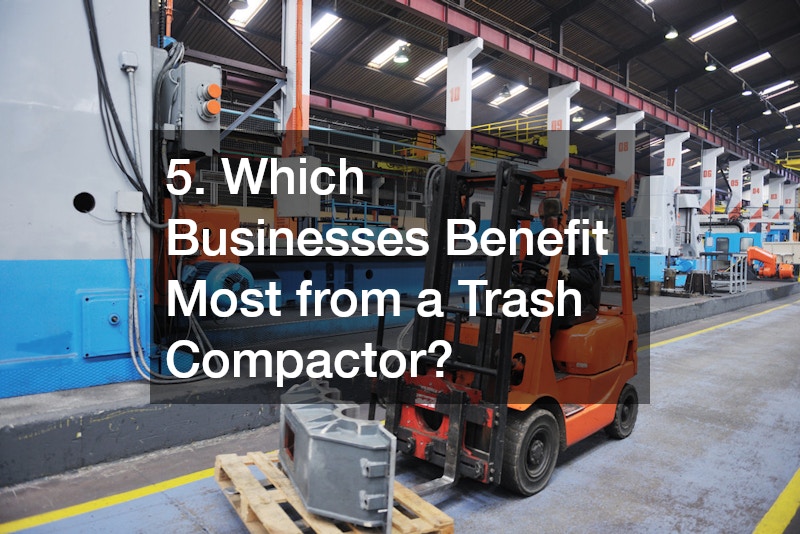Waste management is a pressing challenge that many businesses face today. Industrial trash compactors play a crucial role in addressing these challenges by efficiently handling waste volumes and contributing to sustainability goals.
1. How Does an Industrial Trash Compactor Work?
1.1. Basic Mechanisms and Components
Industrial trash compactors function by using hydraulic systems to pressurize waste material into a smaller, more manageable form. The primary components of these machines include the hydraulic system, compaction chamber, and control panel, all working in unison to ensure efficient operation.
The compaction process involves a ram or metal plate exerting force on the trash, reducing its volume significantly. This mechanism not only optimizes space but also reduces the frequency of waste removal.
Advanced models come equipped with sensors and automation that enhance the compactor’s efficiency and effectiveness. These features provide businesses with smart solutions for maintaining cleanliness and order.
1.2. Types of Waste Suitable for Compaction
Industrial trash compactors are versatile machines capable of compacting a wide range of materials, including recyclables, general waste, and certain types of construction debris. They help businesses manage various waste streams, ensuring clear separation and efficient disposal.
Compacting recyclables such as cardboard, plastics, and paper can greatly enhance recycling efforts. This process not only conserves space but also supports eco-friendly waste management practices.
Understanding the types of waste suitable for compaction enables businesses to effectively customize their waste management strategies. This approach maximizes the benefits of investing in a trash compactor.
2. What are the Benefits of Using a Trash Compactor?
2.1. Cost Savings on Waste Management
Using an industrial trash compactor can significantly reduce the frequency of waste hauling, thereby lowering associated costs. Businesses can experience considerable savings by minimizing the number of pickups required and the volume of waste transported.
This cost efficiency translates into enhanced financial management and resource allocation for other critical business areas. Investing in a compactor proves to be a cost-effective solution in the long run.
The reduction in waste disposal frequency also frees up valuable time, allowing staff to focus on more productive tasks. This operational efficiency is yet another reason why compactors are an asset to businesses.
2.2. Environmental Impact Reduction
Industrial trash compactors actively contribute to decreasing businesses’ ecological footprints by reducing landfill waste. By compacting waste, the volume that ends up in landfills is significantly minimized.
This reduction aligns with sustainability goals, positioning businesses as environmentally responsible entities. Utilizing a trash compactor signals a commitment to green practices that are increasingly demanded by stakeholders.
Moreover, compacted waste takes up less space and degrades faster, potentially reducing the emissions associated with landfill decomposition processes. This makes compactors a cornerstone in comprehensive waste management strategies.
3. How Much Does an Industrial Trash Compactor Cost?
3.1. Initial Investment vs. Long-term Savings
While the initial cost of purchasing a trash compactor can seem substantial, the long-term savings it generates can far outweigh the upfront expense. Reduced hauling fees and operational efficiencies contribute to this return on investment.
Businesses often find that the financial benefits accumulate over time, making compactors a wise investment. Evaluating costs in comparison to savings is essential for informed purchasing decisions.
Long-term savings also include reduced labor costs associated with waste handling. This efficiency highlights the compactor’s role in streamlining business operations.
3.2. Factors Influencing Cost
Several factors influence the price of an industrial trash compactor, including size, brand, and features. Customization options and installation requirements can also impact the final cost.
Larger compactors designed for heavy-duty use may come with a higher price tag, but they offer larger capacity and durability. Investing in a high-quality brand ensures reliability and efficiency.
Ultimately, evaluating these variables helps businesses find a compactor that meets their specific needs and budgets. This informed decision-making aligns financial goals with operational requirements.
4. What are the Maintenance Requirements?
4.1. Routine Maintenance Practices
To maintain optimal performance, regular maintenance of industrial trash compactors is crucial. Routine tasks include checking hydraulic systems, cleaning components, and inspecting compaction chambers.
Proper lubrication and timely replacement of worn parts are essential to prevent operational hiccups. Consistent upkeep ensures the longevity and reliability of the equipment.
Developing a comprehensive maintenance schedule allows businesses to proactively address potential issues. Prevention is key to minimizing downtime and extending the machine’s lifespan.
4.2. Extended Service Plans and Warranties
Many compactors come with warranties that cover certain repairs and replacements. Extended service plans can further maximize the device’s lifespan by providing comprehensive coverage.
These service agreements offer peace of mind by ensuring expert support and maintenance. Businesses can safeguard their investment by considering these options.
Additionally, service plans often include regular inspections and cleaning, contributing to the compactor’s continued functionality. Selecting the right plan supports long-term operational success.
5. Which Businesses Benefit Most from a Trash Compactor?
5.1. High-Waste-Producing Industries
Industries such as hospitality and retail generate significant amounts of waste daily. Integrating an industrial trash compactor can help these businesses manage waste effectively and efficiently.
Compactors reduce the volume of waste, making it easier to handle large quantities. This capacity is especially valuable for businesses dealing with fluctuating waste streams.
Implementing a compactor can optimize productivity and create a cleaner work environment. High-waste industries stand to benefit significantly from this investment.
5.2. Space-Constrained Urban Businesses
Urban businesses often struggle with limited operational space, exacerbating waste management challenges. Trash compactors address this issue by minimizing the space occupied by waste.
Compactors enable businesses to efficiently utilize available space, maintaining a neat and orderly environment. This space management is a crucial advantage for urban-area firms.
By optimizing waste management processes, businesses can focus more on core activities. This streamlining is a hidden benefit of integrating compactors into urban business operations.


